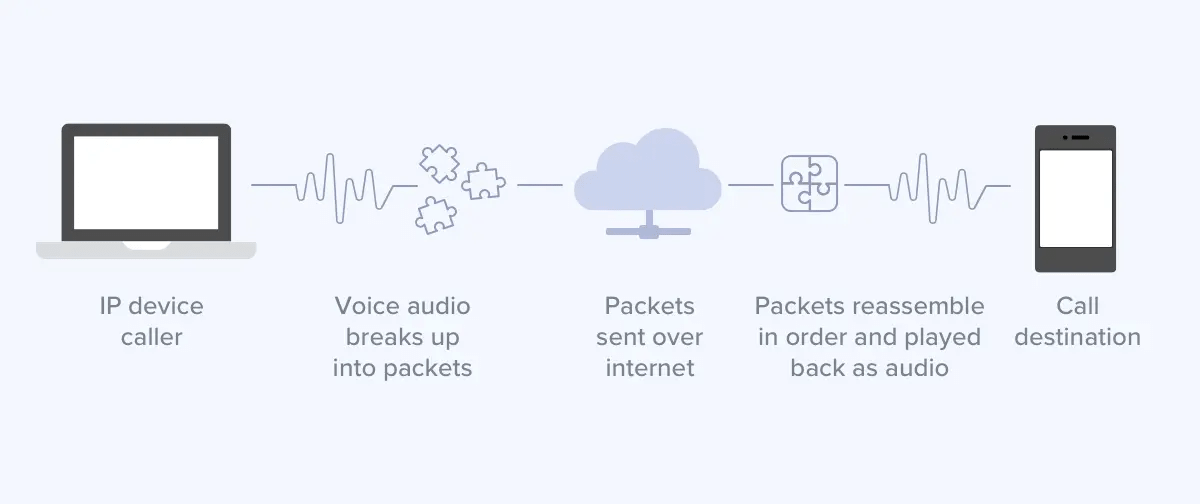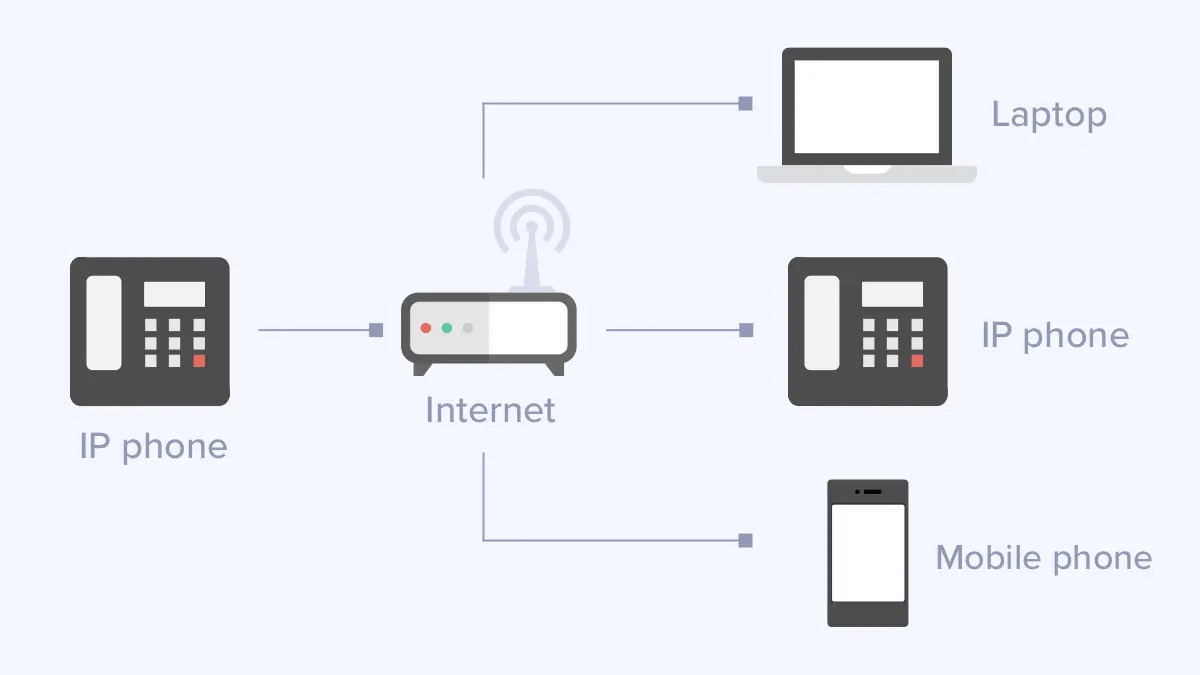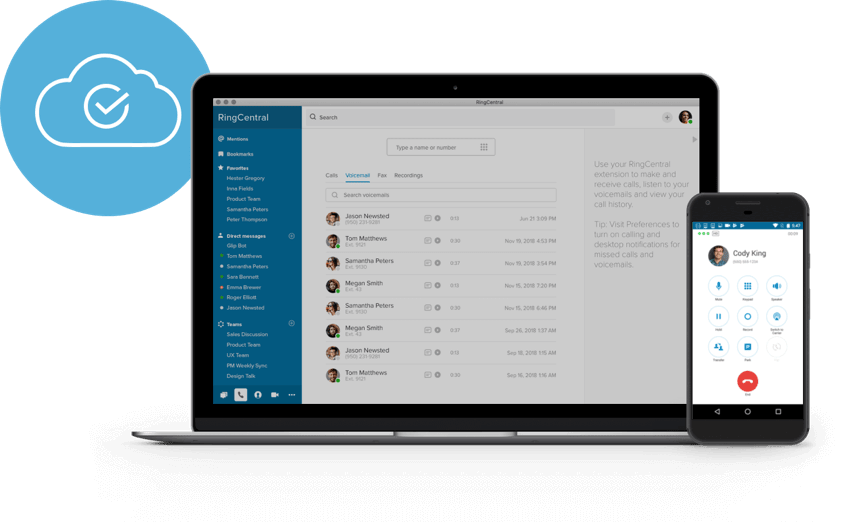
In today’s digital world, VoIP is quickly becoming the preferred telecoms choice for home phone telephone systems and modern businesses alike. VoIP is a convenient, reliable, and cost-effective alternative to legacy phone systems. It’s no wonder that the world of VoIP is expanding rapidly, with new business VoIP service providers popping up regularly. With so many VoIP phone solutions out there, choosing the right service provider to suit your business needs can be challenging. Whether you’re searching for a small business VoIP solution or an enterprise alternative, it’s important to know what to look for. To help you choose the best business VoIP phone service provider, we’ll cover:
Voice over Internet Protocol (VoIP, for short) is a technology that enables the transmission of multimedia content over Internet Protocol (IP) networks. When we talk about VoIP, we’re more often than not referring to voice and audio data; however, it is also the foundation of other forms of media transmission (such as video).
VoIP is the main telephony component in cloud business communications solutions, such as RingCentral, a well-known VoIP business phone provider.
VoIP technology is used to facilitate phone calls and other telephony functions over the internet. Its users can make calls from any device with an internet connection, making it a more flexible and convenient option than traditional landline telephones.
VoIP business phone service works differently depending on what it’s connecting calls to—it can connect to other VoIP lines or traditional landlines.
VoIP works through a set of telephony protocols that use packet switching technology to convert analog voice signals to data packets. These data signals are then sent across the internet. Here’s how a VoIP call works, step by step:

What makes VoIP stand out as the preferred technology for business communications? To fully grasp the power of VoIP, we need to understand how it works in comparison to traditional phone systems.
Traditional landline phones operate using a Public Switched Telephone Network (PSTN). A landline telephone sends coded electricity pulses via copper wire phone lines to transmit soundwaves through a circuit switching method.
Traditional business phone systems require business owners to configure an on-premises PBX that connects employees within a shared network. It requires a ton of hardware and a robust physical infrastructure to facilitate. Some key characteristics of traditional phones include:
When businesses transition to a cloud PBX (also referred to as hosted PBX or virtual PBX), they no longer have to host software on a server in the same way analog systems do. Instead, cloud PBX phone systems host all of your data and software in the cloud. They use VoIP technology to facilitate the transmission of calls through internet connections.
Key features of VoIP business phone services include:
The key difference between landline phones and modern business VoIP phones is the technology required for the phones. Landline phones may have limited features, while VoIP phones are digital phones that can have features that can be enabled.
A landline office phone limits what your employees can do, allowing for only the most basic calling features; Internet phones, on the other hand, allow for voice, video, and unlimited extensions that can empower your employees to communicate and collaborate effectively.
If you’re looking for a VoIP phone solution that offers functionality across different office locations, mobile devices, and within the cloud, then VoIP is right for your business. Moreover, VoIP phones offer business benefits ranging from cost savings to increased flexibility.

There are several different ways to make a VoIP phone call. The method you choose will depend on your specific business needs and the equipment available to you.

One of the best things about shifting from a traditional on-premises PBX to a VoIP business phone system is the array of advanced features they provide. Whether you’re running a call center or need a business VoIP system to connect your internal teams, these features are invaluable.
When choosing between VoIP phone service providers, it’s important to consider which features you require:

There are numerous advantages of switching from a legacy phone system to VoIP.
1. It can save you money.
Legacy phone systems require you to spend a lot up-front, and it becomes expensive (and difficult!) to make changes. VoIP solutions allow companies to save on costs related to:
VoIP service for business solutions, too, are available at affordable prices. The cost of VoIP plans can vary depending on the size of your business and the extra communication and collaboration tools you require.

2. It grows with your business.
VoIP business communication solutions are completely scalable. This means that they grow with your business.
As VoIP business phone systems are hosted and managed in the cloud, you can easily add or remove new users and phone numbers without incurring additional costs. This makes it easy to scale your solution to meet the demands of seasonal customer support spikes, new office locations, or remote teams.
VoIP offers increased mobility for modern businesses. In today’s age of digital transformation, companies rely on technology to stay connected at all times, even on the go.
VoIP services can be accessed from mobile phones (Android, iOS) using a dedicated softphone mobile app. This means employees can take voice calls, join video conferences, and message team members from any internet-connected device.
As business environments become increasingly reliant on globally dispersed teams and remote employees, communications systems must keep users connected no matter where they’re located. As a small business, increased mobility gives you the power to run your business from a smartphone.

Business VoIP solutions are managed by third-party service providers who take care of all your security concerns. Take RingCentral, for example. Users are protected with seven layers of enterprise-grade security across physical, network, host, data, and business processes.
As business VoIP solutions are hosted in the cloud, they offer enhanced business continuity. This means your important business data is secure even in the event of a natural disaster or power outage.
In today’s competitive landscape, shifts in technology and consumer demands are shaping the business world.
Empowering your team with enterprise-grade VoIP phone features for business will enable them to perform to the best of their abilities and bring you one step closer to achieving your business goals. Unified communications systems enable teams to collaborate and communicate effectively with features like:

Modern business VoIP solutions offer an array of telephony features and collaboration tools to streamline business operations. Ask yourself which ones your business needs. For example, do you require advanced call management features, video conferencing functionality, or third-party app integrations?
A unified communications system like RingCentral is ideal for small businesses and large enterprises alike. RingCentral allows you to tailor your communications platform to suit your needs. With access to integrated voice, video, and team messaging, RingCentral empowers your team with everything they need to communicate and collaborate effectively and productively.
Another important aspect of the VoIP solution you choose is whether or not it offers a robust mobile app. As we become more accustomed to the world of remote work, business owners should weigh up the benefits of mobile accessibility in a VoIP communications service.
RingCentral offers a mobile-ready UC solution that can be accessed from any internet-connected device. You can sign in from your Windows or Mac desktop computer or an iPhone or Android mobile device using the RingCentral App. Moreover, RingCentral allows you to switch seamlessly between devices for a truly mobile communications experience.

The final thing to consider when choosing a VoIP service provider is the pricing they offer. Outline your budget and consider the features you need to find the most appropriate solution to suit your needs.
VoIP solutions are much more affordable than managing and maintaining traditional phone systems. VoIP plans are typically available on a monthly basis. The best VoIP business phone providers offer a range of plans to suit the needs of start-ups, SMBs, and enterprises.
RingCentral is the number one business communications solution. Businesses can choose from four different plans, and pricing depends on accessible features. RingCentral’s pricing plan includes: